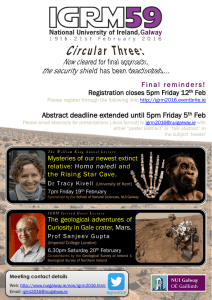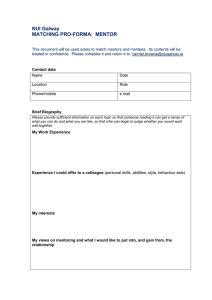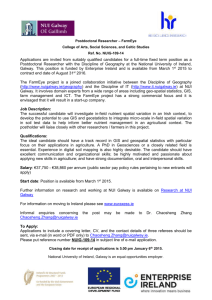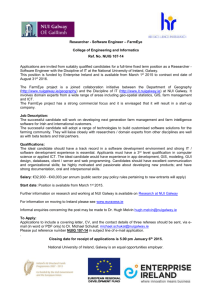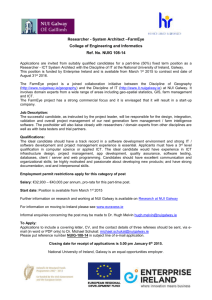Document 14627075
advertisement
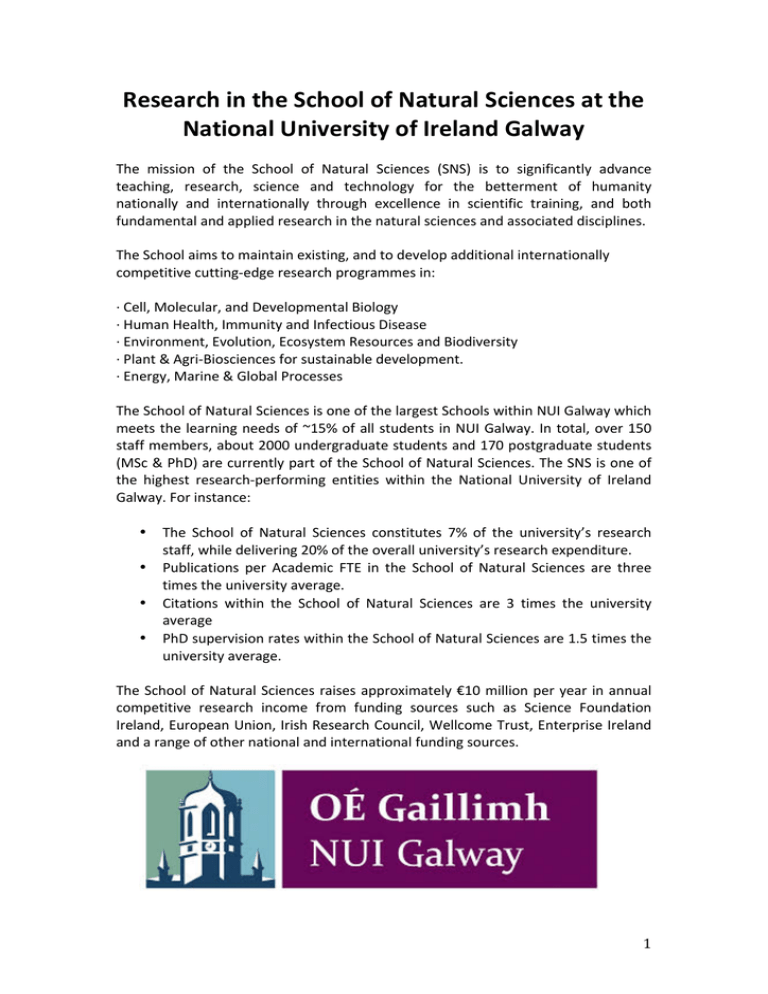
Research in the School of Natural Sciences at the National University of Ireland Galway The mission of the School of Natural Sciences (SNS) is to significantly advance teaching, research, science and technology for the betterment of humanity nationally and internationally through excellence in scientific training, and both fundamental and applied research in the natural sciences and associated disciplines. The School aims to maintain existing, and to develop additional internationally competitive cutting-­‐edge research programmes in: ·∙ Cell, Molecular, and Developmental Biology ·∙ Human Health, Immunity and Infectious Disease ·∙ Environment, Evolution, Ecosystem Resources and Biodiversity ·∙ Plant & Agri-­‐Biosciences for sustainable development. ·∙ Energy, Marine & Global Processes The School of Natural Sciences is one of the largest Schools within NUI Galway which meets the learning needs of ~15% of all students in NUI Galway. In total, over 150 staff members, about 2000 undergraduate students and 170 postgraduate students (MSc & PhD) are currently part of the School of Natural Sciences. The SNS is one of the highest research-­‐performing entities within the National University of Ireland Galway. For instance: • The School of Natural Sciences constitutes 7% of the university’s research staff, while delivering 20% of the overall university’s research expenditure. • Publications per Academic FTE in the School of Natural Sciences are three times the university average. • Citations within the School of Natural Sciences are 3 times the university average • PhD supervision rates within the School of Natural Sciences are 1.5 times the university average. The School of Natural Sciences raises approximately €10 million per year in annual competitive research income from funding sources such as Science Foundation Ireland, European Union, Irish Research Council, Wellcome Trust, Enterprise Ireland and a range of other national and international funding sources. 1 Research in the School of Natural Sciences is organized within nine research units, namely: The Apoptosis Research Centre (ARC) is active in both basic and clinically relevant investigation of this key biological pathway. It is active in both basic and medically relevant investigation of the key pathway in cell survival and cell death. Research areas include stress-­‐induced apoptosis in relation to cancer, diabetes, cardiovascular diseases, neuro degeneration, and the regulation of apoptosis by the tissue microenvironment in cancer. Significant biotechnology applications have arisen from the research of this unit through its efforts in cancer research and treatment, from basic to translational and clinical research, with an ultimate goal of discovery-­‐led improved patient care. WebLink: www.apoptosis.ie Contact: Afshin Samali [afshin.samali@nuigalway.ie] The Centre for Chromosome Biology (CCB) focuses on various aspects of research from chromatin structure to DNA replication and damage response, as well as the regulation of mitotic chromosome structure and segregation. The Centre for Chromosome Biology focuses on various aspects of research from chromatin structure and biochemistry to DNA replication and damage response and regulation of mitotic chromosome structure and segregation. Scientists within the Centre use key model organisms and cellular models of human diseases. Interactions with other disciplines within the University, including Pharmacology, Anatomy, Bioengineering, Chemistry, Physics and Medicine, and the NCBES allowing the group to bring a broad array of perspectives into a highly focused area of research. This internationally recognized group of scientists represents the most concentrated cluster of SFI PIs within a single Irish academic unit and contributes leading research in molecular and cellular biology and human disease. WebLink: www.chromosome.ie Contact: Lowndes, Noel [noel.lowndes@nuigalway.ie] 2 The Biodiversity and Bioresources cluster is concerned with two linked areas: 1) the distribution of species, habitats and ecosystems and 2) the materials, products and services (potential and existing) provided by natural resources. Our principal investigators (PIs) have specialisms in mapping biodiversity in all domains of life (Archaea, Bacteria, Eukaryota) ranging from the Deep Sea to terrestrial systems. We capture research significant research funding in the areas of bioprospecting, biodiscovery and sustainable resource use, but we also tackle environmental problems and have major projects in the area of bioremediation and ecosystem health. We collaborate closely with the State Agencies including the Marine Institute, who have custody of the National Research Vessels, based in Galway, and also with National Parks and Wildlife Service. Ours is a large cluster comprising more than 30 PIs at NUIG and very high quality network of international collaborators. Within NUIG, there are several centers of enabling activities with whom we closely collaborate (e.g. modelling & informatics, socioeconomics and policy, Carna Research Station, GIS Centre). WebLink: www.ryaninstitute.ie/research/ Contact: Power, Annemarie [annemarie.power@nuigalway.ie] The Developmental Biology Cluster (DBC) studies how single cells can grow and develop into highly specialised multicellular organisms. Developmental biology is the study of how single cells can grow and develop into highly specialised multicellular animals and plants. It examines the genetic control of growth, differentiation and specialisation of different cell types and organs. Understanding animal developmental biology is fundamental to stem cell and regenerative medicine, reproductive biology, cancer, ageing and life history theory. NUIG’s developmental biologists are also active in the interdisciplinary field of Evolutionary Biology. They collaborate with researchers working on other topics such as apoptosis, epigenetics, chromatin structure, Immunity, Glycobiology/Glycosciences, Biomedical Engineering, Ecology and Marine Science. Contact: Frank, Uri [uri.frank@nuigalway.ie] 3 Energy Research Centre (ERC) has a major focus of activity on the development of sustainable energy sources such as bioenergy and ocean energy (particularly tidal stream and wave). Research in this area is well-­‐established and highly successful at School level. Supported by long-­‐term recurrent research funding and an excellent track record of outputs, the major focus of activity is on the development of sustainable energy sources such as bioenergy and ocean energy (particularly tidal stream and wave) research. Biomass substrates of particular interest to the cluster are wood and other plant-­‐derived materials (including energy crops and algae), microbes, and waste materials or manure from livestock. WebLink: www.nuigalway.ie/energy/ Contact: Collins, Gavin [gavin.collins@nuigalway.ie] Glycoscience Research Centre (GRC) has a critical mass of expertise in the rapidly emerging and interdisciplinary fields of glycobiology and glycosciences making it a European centre of excellence. NUI Galway has a critical mass of expertise in the rapidly emerging and interdisciplinary fields of glycobiology and glycosciences making it a European centre of excellence. The research activities at NUI Galway in this field span from synthetic carbohydrate chemistry, structural modelling to high throughput analysis, glycoengineering and glycomics; creating an internationally recognized and unique cluster in Ireland. The research in this cluster includes examination of the role(s) of glycans and adhesins and lectins in host-­‐pathogen interactions, regulation of adaptive immune responses, stem cells and tissue regeneration. Additionally, investigators are developing novel synthetic approaches and analytical technologies to facilitate glycomics research and rapid identification of glycan structures and glycan-­‐lectin interactions of clinical and industrial relevance as well as development of glycotherapeutics against chronic and infectious diseases. Some of these approaches include high-­‐throughput analytical and computational tools (glycoinformatics and biomolecular simulations), glycomimic synthesis, biomolecular imaging, glycoenzyme engineering and biosensor technologies. Glycoscience-­‐related technologies are expected to underpin the next generation of biomarkers, diagnostics and therapeutics and will readily translate into various clinical and industrial applications. Glycosciences research at NUI Galway is also embedded with 4 the National Institute for Bioprocess Research and Training, Teagasc, and with biopharmaceutical industries and Bioanalytical industries with the goal to develop and deliver carbohydrate-­‐based diagnostics, therapeutics and nutraceuticals. Contact: Iain Shaw [iain.shaw@nuigalway.ie] Infectious Disease and Immunity Cluster (IDIC) hosts wide-­‐ranging research into microbial diseases. The Infectious Disease and Immunity Cluster hosts wide-­‐ ranging research into microbial and viral diseases. The spectrum of activity runs from studying the molecular biology of pathogenesis (with bacteria, fungal, yeast and viral pathogens), through to understanding pathogen-­‐host cell interactions and host animals responses. Much of the work in the Cluster is directed at development of new and improved intervention strategies, and specifically at identifying targets for diagnostics, novel vaccines and antimicrobial drugs. There are particular research strengths in microbial genetics, biochemistry and physiology, which, together with expertise in molecular pathogenicity, cellular and molecular immunology, and epidemiology, underpin the research programs. The Cluster has well-­‐established Inter-­‐School links involving Microbiology, Bacteriology, the Molecular Diagnostics Research Group (MDRG), and the NCBES and has a strong record of collaborative, inter-­‐disciplinary research in the field of infection and immunity. The Cluster also has strong collaborative links with leading research institutions including Cornell University, Karolinska Institute and the Pasteur Institute. In addition, there are numerous formal partnerships in place with industry, including multinational companies such as Roche, BioMerieux and Beckman Coulter. Contact: James P O'Gara [jamesp.ogara@nuigalway.ie] Marine and BioGeosciences Research Cluster (MBGRC) conducts research into marine and terrestrial geophysics, geochemistry and biogeochemistry. Marine research within the School ranges from off-­‐shore geophysical investigations to biochemical and molecular analyses of marine bioresources of environmental and commercial importance. The research investigates the relationship between primary productivity, secondary compound production and ecosystem functioning and stability, with applications in environmental technologies and management, and emerging biotechnologies of industrial interest. Research into physiological and biochemical processes and algal-­‐ 5 environment interactions is used for ecological modelling. These studies give rise to internal and external collaborations in the field of climate change (e.g. with the Centre for Climate Change and Air Pollution Studies (C-­‐CAPS), ECI) and, in Biogeosciences, in the fields of aquatic eutrophication and pollution (e.g. Metals in the Marine Environment (MIME) group). Biogeoscience research studies the seabed offshore Ireland and groundwater-­‐seawater interactions in the coastal zone, and encompasses the use of geophysical techniques in seabed mapping to predict benthic habitats for key marine species. It also involves modelling of both oceanic and groundwater currents, interpreting data from marine sediment with reference to climate change and understanding marine sediment transport paths. The biodiversity and dynamics of deep-­‐water ecosystems research is focused on cold-­‐ water corals, fish, the shelf edge and seamounts. Physical-­‐biological interactions are studied through long-­‐term deployment of in situ instrumented oceanographic moorings. Geoscience research includes chemistry of the crust and biosphere, magmatic processes and global tectonics. Weblink: www.nuigalway.ie/biogeoscience/ Contact: Anthony Grehan [anthony.grehan@nuigalway.ie] The Ecosystem Science Cluster supports field based research in the physical environment and in natural, managed, and disturbed ecosystems, including those in terrestrial, freshwater, wetland and marine environments. It brings together researchers for whom terrestrial / aquatic landscapes and processes are their primary focus and indeed their primary laboratory. NUI Galway is strategically located in a globally unique coastal environment and recognises this by including marine and environment research within its strategic plan. The Cluster has well-­‐established intra-­‐School links between Botany / Plant Science, Earth & Ocean Science, Environmental Science, Zoology and the Ryan Institute. The research of the cluster underpins Ireland’s obligations under a number of EU directives (including the Water Framework Directive, the Marine Strategy Framework Directive, the Groundwater Directive, the Floods Directive, the Management of Waste from Extractive Industries Directive and Habitats Directive among others). Funding is secured from a variety of sources including PRTLI, NDP, Science Foundation Ireland, IRCSET, Enterprise Ireland, the Griffiths Awards (managed by the GSI), the EPA, Teagasc, Coillte, the Marine Institute, National Parks &Wildlife Service and the EU. The Ecosystem Science Cluster offers assistance and guidance to local authorities and government agencies in addressing the requirements of various directives and works as project partners with many of the same local authorities. Contact: Eve Daly [eve.daly@nuigalway.ie] 6 Plant and Agricultural Biosciences Centre (PABC) consists of researchers, research groups, companies and institutions sharing a common interest in fostering and promoting plant and agricultural biosciences innovation. A unifying theme of the PABC is the promotion of plant and agricultural biosciences for sustainable development to meet social and economic challenges in Ireland, the EU and internationally (including in developing countries). There is a rapidly growing demand for food, feed, fibre and fuel worldwide. The World Bank estimates that each hectare of land will need to feed 5 people in 2025 compared to just 2 people in 1960. Such productivity increases represent a phenomenal challenge as they will need to be achieved in parallel with reducing the environmental footprint of agriculture. To sustainably achieve these productivity increases will require the effective harnessing of both fundamental and applied advances in plant (and agricultural) biosciences and biotechnology. The PABC interacts significantly with a range of industrial and institutional in Ireland and internationally, who consider the PABC of strategic importance. Researchers in the PABC also have extensive research links with research partners and institutes in developing countries. Weblink: www.plantagbiosciences.org Contact: Charles Spillane [charles.spillane@nuigalway.ie] The vast majority of the Principal Investigators (Research Group Leaders) within the above SNS Research Units are also Academic Staff members within each of the five Disciplines of SNS. This also applies to the Ryan Institute and to the NCBES/Biosciences Institute where SNS Academic Staff are major contributors to the research activities of both NUIG Research Institutes. www.nuigalway.ie/natural_sciences/ 7
